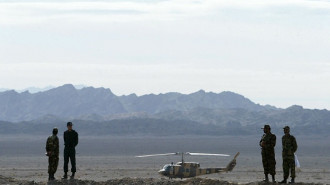Controversial US peace plan 'to raise $50bn' for Palestine's economy
The United States said its Middle East peace plan to be presented next week in Bahrain aims to raise more than $50 billion for the Palestinians and create one million jobs for them within a decade.
Unveiling details for the first time of its long-awaited peace initiative, President Donald Trump's administration said it was looking to attract unprecedented international investment to the Palestinians and to dramatically improve infrastructure and internal governance in the West Bank and Gaza Strip.
The conference on Tuesday and Wednesday in Bahrain, led by Trump's son-in-law and adviser Jared Kushner, is the opening of the US government's delayed peace effort, which officials say will later include a political component.
But the Palestinian Authority is boycotting the so-called Peace to Prosperity workshop and a senior official swiftly rejected the plan, charging that the unabashedly pro-Israel Trump is seeking to buy off the Palestinians and deprive them of an independent state.
The White House cast the plan - to be discussed in more detail in Bahrain with finance chiefs of oil-rich Gulf Arab states - as historic.
"Peace to Prosperity represents the most ambitious and comprehensive international effort for the Palestinian people to date," the plan released by the White House said.
"It has the ability to fundamentally transform the West Bank and Gaza and to open a new chapter in Palestinian history - one defined, not by adversity and loss, but by freedom and dignity," it said.
It said that the plan aimed to raise more than $50 billion over the next decade, with a goal of more than doubling Palestinian gross domestic product.
The White House said the controversial initiative had the power to transform the troubled Palestinian economy by creating more than one million jobs - bringing the unemployment rate down to the single digits, in line with developed economies - and reducing the poverty rate by 50 percent.
It said that money would be administered by a multinational development bank - not the Palestinian Authority - as a way to ensure better governance and prevent corruption.
Palestinian boycott
The Bahrain conference is seen as a betrayal by Palestinians and a symbol of Arabs endorsing the US' plan for the future of the Middle East, despite the Trump administration's notorious support of Israel's illegal occupation and annexation of East Jerusalem.
The Bahrain conference is backed by Saudi Arabia and the UAE, despite a Palestinian boycott. Palestinians say they were not consulted about the conference.
Palestinian factions have come together to host their own summit to discuss the future of Palestine, in a meeting that will take place at the exact same time as Bahrain’s Deal of the Century conference on 25-26 June.
The Palestinian Liberation Organisation (PLO), the Popular Front for the Liberation of Palestine (PFLP) and Hamas will attend the summit in Lebanon's capital city, in what is an apparent snub to the upcoming Manama summit.
Senior Palestinian official Hanan Ashrawi quickly rejected the plan, saying that the United States should instead press Israel to allow the Palestinians to thrive.
"First lift the siege of Gaza, stop the Israeli theft of our land, resources and funds, give us our freedom of movement and control over our borders, airspace, territorial waters etc. Then watch us build a vibrant prosperous economy as a free and sovereign people," she tweeted.
The Palestinian leadership is deeply distrustful of Kushner, a family friend of Israeli Prime Minister Binyamin Netanyahu, and Trump, who has taken a series of landmark steps to support Israel including recognising bitterly divided Jerusalem as its capital.
US officials have hinted that the eventual peace plan will not mention the creation of an independent Palestinian state, a goal of decades of often intense US diplomacy.
Jason Greenblatt, a senior aide to Trump who crafted the peace plan alongside Kushner, said that the political component may come as late as November once Israel has a new government in place.
The plan had already been held up due to Israel's elections in April, but the country is going to the polls again after Netanyahu failed to form a coalition.
Improving infrastructure, governance
After spending more than two years working on the plan, Kushner offered a framework full of specifics - even lauding the ice cream of Ramallah in a section on promoting tourism.
But it remains unclear who will pay the bill for the Peace to Prosperity plan and whether Gulf Arabs - who have increasingly found common cause with Israel due to their mutual hostility toward Iran - will be willing to contribute even before a political settlement.
Palestine’s Hamas, which controls the Gaza Strip, has also sharply rejected the Bahrain conference, with the group's leader Ismail Haniyeh saying the workshop aimed to transform "the Palestinian cause from a political cause to an economic cause."
The economic plan, without any direct mention of Hamas, nonetheless said it also aimed to assist the Gaza Strip.
Projects include a $590 million upgrade of Gaza's main power plant, which the White House said would create tens of thousands of jobs and provide reliable energy for the first time in years to the crowded and impoverished territory.
It also called for some $900 million in grants to improve roads, cargo terminals and border crossings to link the Palestinian economy to its Arab neighbours - but not to Israel, which has sought a physical separation from the territories.
Follow us on Twitter: @The_NewArab

![Palestinians mourned the victims of an Israeli strike on Deir al-Balah [Getty]](/sites/default/files/styles/image_684x385/public/2024-11/GettyImages-2182362043.jpg?h=199d8c1f&itok=xSHZFbmc)


![The law could be enforced against teachers without prior notice [Getty]](/sites/default/files/styles/image_684x385/public/2178740715.jpeg?h=a5f2f23a&itok=hnqrCS4x)
 Follow the Middle East's top stories in English at The New Arab on Google News
Follow the Middle East's top stories in English at The New Arab on Google News
![Fakhrizadeh [AFP] Fakhrizadeh [AFP]](/sites/default/files/styles/image_330x185/public/media/images/774C39F7-8F7A-4D67-B998-27D102FCB4A7.png?h=d1cb525d&itok=j9eGvunV)

